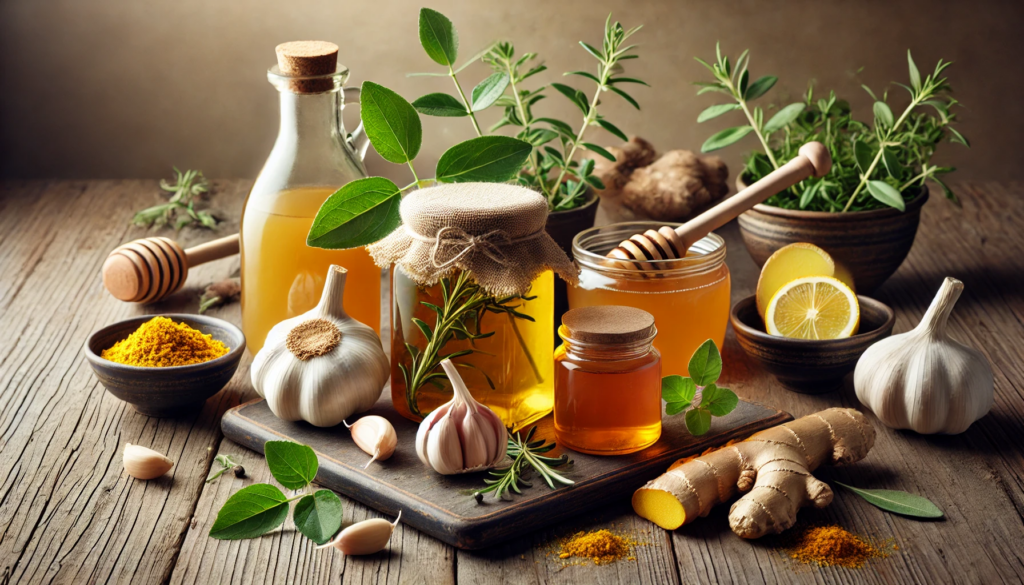
In a world where antibiotics are widely used to treat bacterial infections and illnesses caused by contaminated food and water, many are searching for natural alternatives to avoid the long-term side effects of these medications. Over time, antibiotics can disrupt the delicate balance of the gut microbiome, which can lead to depression, anxiety, and weakened immunity. Fortunately, nature offers powerful solutions that can help fight infections, support the gut, and improve health without the downsides of antibiotics.
This comprehensive guide will cover the best natural antibiotic alternatives, how to use them effectively, and a detailed plan for incorporating them into your routine. By the end of this post, you’ll have the knowledge to protect yourself from common infections while supporting your long-term health.

Natural Antibiotic Alternative Supplements
Here is a list of supplements that can sometimes replace modern medicine and has been used for thousands of years by your ancestors.
- Oregano Oil Capsules
- Properties: Antibacterial, antifungal, antiviral
- How to Use: 2-3 drops diluted or 150 mg capsule daily for up to 2 weeks
- Benefits: Fights bacteria and supports immune health.
- Aged Garlic Extract
- Properties: Antibacterial, immune-boosting
- How to Use: 600-1,200 mg daily, split into doses
- Benefits: Fights infections and supports cardiovascular health.
- Berberine (from Goldenseal)
- Properties: Antibacterial, antifungal, anti-parasitic
- How to Use: 500 mg twice daily for up to a week
- Benefits: Effective for gut health and combating infections.
- Probiotics (Saccharomyces boulardii, Lactobacillus)
- Properties: Restores gut microbiome balance
- How to Use: 1-2 capsules daily, especially after antibiotic use
- Benefits: Supports digestion and immunity.
- Activated Charcoal
- Properties: Detoxifying, binds toxins
- How to Use: 500 mg with water, away from other supplements
- Benefits: Helps with food poisoning and cleansing the digestive tract.
- Peppermint Oil Capsules
- Properties: Antimicrobial, antispasmodic
- How to Use: One enteric-coated capsule with meals
- Benefits: Soothes digestion and fights bacteria.
- Turmeric (with Black Pepper)
- Properties: Anti-inflammatory, antibacterial
- How to Use: 500-1,000 mg daily, or in food
- Benefits: Reduces gut inflammation and supports immune health.
- Manuka Honey (UMF 10+ or higher)
- Properties: Antibacterial, healing
- How to Use: 1-2 tsp daily, raw or in tea
- Benefits: Supports immune health and soothes gut inflammation.
- Neem Extract
- Properties: Antibacterial, antiviral, antiparasitic
- How to Use: 1-2 capsules daily for short durations
- Benefits: Effective against a variety of pathogens.
- Colloidal Silver
- Properties: Antibacterial, antiviral
- How to Use: Follow dosage guidelines on the product, avoid using with probiotics
- Benefits: Supports immune health and fights infections.
OTHER SUPPLEMENT LIMITED OFFERS (Just updated)
EUROPE:
Boost your immune system – https://markbarner.com/immuneboost
Parasite cleanse – https://markbarner.com/antiparasite
Healthier kidney – https://markbarner.com/kidneyhealth
Better Brain – https://markbarner.com/healthybrain
Magnesium Must have – https://markbarner.com/magnesium
Microplastic Detox – https://markbarner.com/plasticdetox
Solaray products – https://markbarner.com/solaray
DENMARK + SPAIN:
Fast parasite remover: https://markbarner.com/paragon
AMERICA:
Solaray quality supplements: https://amzn.to/3MLz19o
Solgar quality supplements: https://amzn.to/3B230XP
NOW foods supplements: https://amzn.to/3ziZKqu
Anti-Parasite: https://amzn.to/4eqdBud
Warmwood anti-parasite: https://amzn.to/4d7RMOK
Cleanse +Detox: https://amzn.to/3z8aeZZ
Thyroid & Hormone issues: https://amzn.to/3XJiKaY
Why Seek Alternatives to Antibiotics?
Antibiotics are life-saving drugs, but they come with several potential drawbacks when used frequently or unnecessarily:
- Gut Microbiome Disruption: Antibiotics kill both harmful and beneficial bacteria, which can result in an imbalanced microbiome. This can lead to digestive issues, mental health problems, and a weakened immune system.
- Antibiotic Resistance: Bacteria can adapt and develop resistance to antibiotics, making future infections harder to treat.
- Increased Risk of Inflammatory Diseases: Long-term use of antibiotics has been associated with autoimmune diseases, chronic fatigue syndrome, and other inflammatory conditions.
Seeking natural alternatives is a proactive way to protect your health while avoiding these potential issues. Below are some of the most potent natural remedies, backed by both traditional wisdom and scientific research, that can serve as alternatives to antibiotics.
Natural Remedies with Antibiotic-Like Properties
1. Oregano Oil
Known for its high concentrations of carvacrol and thymol, oregano oil has powerful antimicrobial properties that can kill bacteria, viruses, and even some fungi. It’s effective against pathogens like E. coli and Salmonella and can be used to treat mild to moderate infections. You can even make it yourself
- How to Use: Take 2-3 drops of oregano oil diluted in water, twice daily, for up to 14 days. Avoid taking it continuously as it can disrupt the gut microbiome over time.
2. Garlic
Garlic has been revered for centuries for its medicinal properties. The compound allicin, which is released when garlic is crushed, has potent antibacterial, antiviral, and antifungal effects. Garlic can be used for food poisoning, respiratory infections, and general immune support.
- How to Use: Crush one clove of garlic, let it sit for 10 minutes to activate allicin, then consume raw or mixed with honey. Take this once or twice daily during an infection.
3. Ginger
Ginger is well-known for its soothing effect on the digestive system, but it also has significant antimicrobial and anti-inflammatory properties. It can help relieve nausea, vomiting, and diarrhea associated with infections while fighting off pathogens.
- How to Use: Make fresh ginger tea by steeping grated ginger in hot water. Drink 1-2 cups daily, or take ginger supplements according to the recommended dosage.
4. Goldenseal (Berberine)
Goldenseal is rich in berberine, a compound with strong antimicrobial effects that can kill bacteria, fungi, and parasites. It’s particularly useful for treating gastrointestinal infections and soothing mucous membranes.
- How to Use: Take 500 mg of goldenseal extract twice daily for up to 7 days. Avoid using it for prolonged periods as it can be harsh on the liver.
5. Activated Charcoal
Activated charcoal is a natural detoxifier that binds to toxins and harmful substances in the gut, making it especially effective for cases of food poisoning. It can help cleanse the digestive tract by absorbing bacteria and toxins.
- How to Use: Take 500-1000 mg of activated charcoal with plenty of water. Ensure it’s taken at least 2 hours away from other supplements or food to avoid reducing their absorption.
6. Probiotics and Fermented Foods
After clearing out harmful pathogens, it’s essential to restore beneficial bacteria in the gut. Probiotics like Saccharomyces boulardii and Lactobacillus species can help rebalance the gut microbiome, while fermented foods provide a natural source of beneficial bacteria.
- How to Use: Take a high-quality probiotic supplement daily, or include fermented foods like kefir, yogurt, and sauerkraut in your meals.
7. Peppermint Oil
Peppermint oil has antispasmodic and antimicrobial properties that can alleviate digestive discomfort associated with infections, such as cramping, bloating, and nausea.
- How to Use: Take enteric-coated peppermint oil capsules with meals, or sip on peppermint tea throughout the day.
8. Turmeric
Turmeric, known for its anti-inflammatory compound curcumin, is excellent for reducing gut inflammation and combating harmful bacteria. It’s particularly effective when combined with black pepper, which enhances curcumin absorption.
- How to Use: Take turmeric capsules or add turmeric powder to your meals. Combine it with black pepper or a fat source for better absorption.
9. Manuka Honey
Manuka honey is celebrated for its antibacterial and healing properties. It can help soothe an inflamed gut, fight infection, and support the immune system.
- How to Use: Take 1-2 teaspoons of raw Manuka honey daily, either on its own or mixed into tea.
10. Apple Cider Vinegar (ACV)
Raw, unfiltered apple cider vinegar has antimicrobial properties and can aid digestion by restoring stomach acid levels, which helps eliminate harmful bacteria.
- How to Use: Dilute 1-2 tablespoons of ACV in water and drink before meals.
11. Neem
Neem is a powerful antimicrobial and antiparasitic herb that has been used in Ayurvedic medicine for centuries. It’s effective for treating infections caused by bacteria, viruses, and parasites.
- How to Use: Neem can be taken in capsule form, as a tea, or as an oil. Use it for short durations.
What Not to Combine
While many natural remedies work well together, some should be used with caution:
- Activated Charcoal: This should always be taken on its own, as it can bind to other substances, reducing their effectiveness.
- Colloidal Silver: Avoid combining with probiotics, as it may kill beneficial bacteria. Take at least 4 hours apart.
- Goldenseal (Berberine): Berberine may reduce the effectiveness of probiotics, so space them several hours apart.
A 30-Day Natural Remedy Plan for Gut Health and Infection Prevention
Here’s a step-by-step plan to help you incorporate these remedies into your daily routine. It cycles through antimicrobial phases and gut recovery periods to maintain a balanced approach.
Week 1: Cleanse and Detox
This week focuses on using natural antimicrobials to eliminate harmful pathogens from the body.
- Days 1-3: Oregano oil (2 drops in water, twice daily) and Garlic (1 crushed clove with honey).
- Days 1-7: Ginger tea (1-2 cups daily) and Peppermint oil (1 capsule with meals).
- Days 4-7: Goldenseal (500 mg twice daily).
Note: Avoid probiotics during this phase to allow the antimicrobials to work effectively.
Week 2: Restore Gut Health
Once pathogens are cleared, it’s time to rebuild the gut microbiome.
- Days 8-14: Saccharomyces boulardii or broad-spectrum probiotics (1-2 capsules daily).
- Days 8-14: Fermented foods with meals (yogurt, kefir, sauerkraut).
- Daily: Manuka honey (1 tsp), Turmeric capsules or powder in food.
Week 3: Support and Strengthen
Focus on maintaining a balanced gut while continuing gentle detoxification.
- Days 15-21: Continue probiotics and fermented foods.
- Days 15-17: Colloidal silver (1 tsp daily), away from probiotics.
- Days 18-21: Activated charcoal (500 mg in the evening, away from other supplements).
Week 4: Maintenance and Recovery
The final week focuses on gut recovery and supporting the immune system.
- Days 22-28: Continue probiotics and fermented foods.
- Daily: Apple cider vinegar (1 tbsp in water before meals), Ginger and turmeric tea.
Tips for Success
- Hydrate: Drink plenty of water, especially when taking activated charcoal and antimicrobial herbs.
- Listen to Your Body: If any remedy causes discomfort, reduce the dosage or discontinue use.
- Consult a Healthcare Professional: Especially if you have pre-existing health conditions or are taking medications.
Conclusion
Natural remedies offer powerful and effective alternatives to antibiotics, helping to fight infections while protecting your gut health. By using herbs like oregano oil, garlic, ginger, and probiotics strategically, you can reduce your reliance on antibiotics and enjoy better overall health.
For those seeking to protect their microbiome and stay healthy naturally, these remedies provide a holistic approach to infection prevention and gut restoration. Start your natural healing journey today and experience the benefits of what nature has to offer!
Discover more from
Subscribe to get the latest posts sent to your email.
